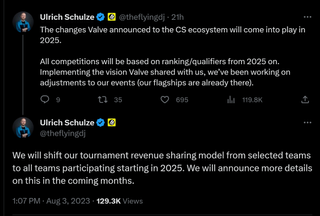Valve resets the rules on pro CS:GO tournaments: 'we've seen professional Counter-Strike drift away' from its ideals
The new rules will forbid business agreements between CS:GO pro teams and tournament organizers.

After years of taking a hands-off approach to the pro CS:GO scene, Valve has very suddenly announced major changes to the rules governing tournament organizers that it says will help ensure that ability, and not money, determine which teams rise to the top of competitive events.
"Counter-Strike is at its best when teams compete on a level playing field and when ability is the only limit to their success," Valve wrote. "Over the past few years, we’ve seen professional Counter-Strike drift away from that ideal. The ecosystem has become gradually less open, with access to the highest levels of competition increasingly gated by business relationships."
A good example of this is the ESL Pro League's "Louvre Agreement," which enables "a select group of elite teams to participate in the Pro League on an ongoing basis." Those teams share in the revenues earned by ESL and are given permanent slots in the league every season, and the only way they can lose that slot is by finishing last in their group in three out of four seasons, at which point their place in the slot "shall be subject to review." A form of relegation not unfamiliar with European football fans, in other words, but with financial entanglements.
An obvious spinoff effect of this deal is that it's much harder for up-and-coming teams to earn a place in top-tier tournaments, because only a small number of leftover slots are open to them. Valve's new rule changes are aimed directly at changing that situation by forbidding business partnerships between organizers and teams—details are still being finalized, but these are "the broad strokes":
- Tournament organizers will no longer have unique business relationships or other conflicts of interest with teams that participate in their events.
- Invitations to all tournaments will use our ranking system, or otherwise be determined by open qualifiers.
- Any compensation for participating teams—prize pool or otherwise—will be made public and will be driven by objective criteria that can be inspected by the community.
Essentially, arrangements like the Louvre Agreement will be outlawed: Instead, all tournament seeding will be determined solely by performance. I wouldn't expect the change to make an immediate difference in the lineups we see at major competitive events—top pro teams are generally going to be at the top of the heap with or without a qualifying bye—but it does increase the odds of newcomers making their way to the big stage.
"There will be some rough edges to the transition, but we’re committed to the long-term health of Counter-Strike as a sport and are looking forward to its bright and open future," Valve said.
These changes won't take effect immediately: Valve said that because some tournaments already have long-term commitments with pro teams in place, and so the new rules won't take effect until 2025. Perhaps not coincidentally, that's when the current ESL Pro League Louvre Agreement is due to expire.
The biggest gaming news, reviews and hardware deals
Keep up to date with the most important stories and the best deals, as picked by the PC Gamer team.
After initially responding with a "Let's do this" on Twitter, ESL vice president Ulrich Schulze confirmed said changes will be made to accommodate the new rules when they come into effect.
"The changes Valve announced to the CS ecosystem will come into play in 2025," Schulze tweeted. "All competitions will be based on ranking/qualifiers from 2025 on. Implementing the vision Valve shared with us, we’ve been working on adjustments to our events (our flagships are already there).
"We will shift our tournament revenue sharing model from selected teams to all teams participating starting in 2025. We will announce more details on this in the coming months."

Andy has been gaming on PCs from the very beginning, starting as a youngster with text adventures and primitive action games on a cassette-based TRS80. From there he graduated to the glory days of Sierra Online adventures and Microprose sims, ran a local BBS, learned how to build PCs, and developed a longstanding love of RPGs, immersive sims, and shooters. He began writing videogame news in 2007 for The Escapist and somehow managed to avoid getting fired until 2014, when he joined the storied ranks of PC Gamer. He covers all aspects of the industry, from new game announcements and patch notes to legal disputes, Twitch beefs, esports, and Henry Cavill. Lots of Henry Cavill.
Most Popular






